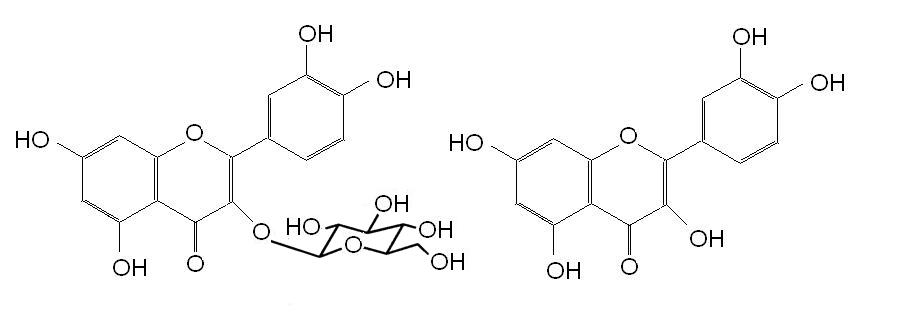Quercetin is a member of the flavonol group of flavonoids, and has been extensively researched for its protective effects against cancer and cardiovascular disease. Quercetin is thought to have health benefits because it is a good reducing agent on account of its numerous hydroxyl groups within its molecular structure (figure 1). Quercetin is able to donate electrons to free radicals and thus quench free radical chain reactions before they damage cellular components or tissues. This antioxidant effect is though to confer anti-inflammatory properties on quercetin, and mounting research suggests that quercetin is an effective anti-inflammatory in humans. Quercetin may be beneficial in protecting against cardiovascular disease because it is able to decrease oxidative stress within the endothelial lining of blood vessels and thus decrease blood pressure.
 Figure 1. Quercetin glycoside (left) and quercetin aglycone (right).
Figure 1. Quercetin glycoside (left) and quercetin aglycone (right).
For example, researched published in the Journal of Nutrition in 20071, suggests that quercetin may be effective at reducing blood pressure in humans. In the study, researchers gave hypertensive patients 730 mg of quercetin or a placebo for 28 days. In the treatment group, systolic, diastolic and mean arterial blood pressure decreased by 7, 5 and 5 mm Hg respectively, compared to the placebo. This human trial supported previous work in animals that found blood pressure lowering effects for quercetin supplements. The study found quercetin effective in stage 1 hypertensive subjects (blood pressure 140 to 159 mm Hg systolic / 90 to 99 mm Hg diastolic) but not prehypertensive subjects (blood pressure 120 to 139 mm Hg systolic / 80 to 89 mm Hg diastolic), suggesting that quercetin is more effective at lowering blood pressure in severe cases.
Onions, apples, berries and red wine are good sources of quercetin, but questions still surround its bioavailability. Research is conflicting, but quercetin from cooked and raw onions appears to be well absorbed and metabolites are found in plasma and urine. Obtaining quercetin from the diet for general health makes sense as foods containing quercetin also contain other phytonutrients and minerals and vitamins that help maintain a balanced healthy diet. However, if blood pressure reduction is the goal, supplementation with 730 mg of quercetin in the form of a dietary supplement is recommended because research has shown this to be effective. Although the reduction in blood pressure in this study were modest, they are significant in that quercetin is not associated with side effects seen with allopathic medication.
RdB
